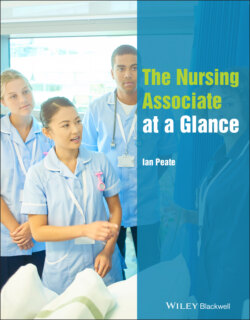Читать книгу The Nursing Associate at a Glance - Ian Peate - Страница 23
Оглавление11 Advocacy and person‐centred sensitive care
At the point of registration, the Nursing Associate will be able to: provide, promote and where appropriate advocate for non‐discriminatory, person‐centred and sensitive care at all times. Reflect on people’s values and beliefs, diverse backgrounds, cultural characteristics, language requirements, needs and preferences, taking account any need for adjustments.
Figure 11.1 Eight principles associated with quality improvement (Picker Institute Europe, 2020).
Table 11.1 The four principles of person‐centred care (Health Foundation, 2016).
| Affording people dignity, compassion and respect.Offering coordinated care, support or treatment.Offering personalised care, support or treatment.Supporting people to recognise and develop their own strengths and abilities to enable them to live an independent and fulfilling life. |
Table 11.2 PANEL principles (Scottish Human Rights Commission, 2020).
| Participation | Everyone has the right to participate in decisions that affect their human rights |
| Accountability | Effective monitoring as well as effective remedies for breaches in human rights |
| Non‐discrimination and equality | All forms of discrimination must be prohibited, prevented or eliminated |
| Empowerment | Individuals and communities should know their rights |
| Legality | Needs to be recognised that rights are legally enforceable |
Top Tip
Discrimination is not only offensive – it is also illegal.
Person‐centred sensitive care
One of the central components of quality healthcare is patient experience. Positive associations have been identified between patient experience, patient safety, clinical effectiveness and a non‐discriminatory approach. People’s experiences of care provision have to be understood and responded to so as to improve care delivery and quality. The Picker Institute Europe (2019) have identified eight Principles of Person‐Centred Care that provide a quality improvement framework. These principles can be used to enable individuals and organisations to understand the experiences of those who use services and staff so as to assist with quality improvement (see Figure 11.1).
Towards a Definition
There is no single agreed definition of the term ‘person‐centred care’. This concept is used to refer to several different principles and activities. Person‐centred care is very much a dynamic, fluid concept. If the Nursing Associate is to offer care that is person centred, then what this looks like will very much depend on individual needs, unique circumstances and the personal preferences of the person receiving care. What might be important to one person with regards to their health and well‐being needs may be unnecessary, or even unacceptable, to another. It should also be remembered that individual needs may change over time. The Health Foundation (2016) has identified a framework that embraces four Principles of Person‐Centred Care (see Table 11.1).
Whenever the Nursing Associate is offering care to people, this should be guided by the principles outlined in Figure 11.1 and Table 11.1. The provision of person‐centred care, within any healthcare experience, involves a combination of these guiding principles, along with adherence to the tenets outlined in the Code.
Advocacy
The roles of the Nursing Associate are varied and complex, and acting as an advocate is one of those roles. Underpinning all chapters of this text is the therapeutic Nursing Associate–patient relationship. This relationship, a helping relationship that is steeped in trust, is a special relationship that should never be taken for granted. The Nursing Associate at all times is required to provide, promote and where appropriate advocate for non‐discriminatory, person‐centred and sensitive care. This has to take into account people’s values and beliefs, their backgrounds, cultural characteristics, language requirements, their needs and preferences and to make any adjustments where necessary.
In order to provide contemporary care, there is a need for fundamental changes in how health and social care professionals deliver care. An important change requires ensuring the delivery of care, treatment offered and services provided reflects a rights‐based approach, which requires that the person is at the centre of all we do. In advocating for people, the challenge is to positively manage risk and deliver care amid complex legal and ethical processes that have to guide practice.
A rights‐based approach means advocating for those who are in need and providing people with greater opportunities to participate in shaping the decisions that impact them (their human rights). It also means increasing the ability of those with responsibility for fulfilling rights to recognise and know how to respect those rights and make sure they can be held to account. The PANEL principles (Table 11.2) highlight some underlying principles which are of fundamental importance in applying a human‐rights‐based approach in practice.
In all of its guises, advocacy should aim to ensure that people, particularly those in our society who are most vulnerable, are able to have their voice heard on issues that they consider important to them, defend and safeguard their rights and have their views and their wishes genuinely considered when decisions are being made about their lives. For those people who cannot articulate their views about their care and treatment, regardless of the reason, advocacy is an important approach by which a person can be considered and protected in what can be very complex decision‐making about how they wish to live their lives and how their care is provided.
A relative or carer can be an advocate; someone close to the person, representing what the person would decide if they were able to make their own decisions. A Nursing Associate or health and social care professional could be an advocate for a person who has no one else, supporting them in understanding what is being proposed about their care and treatment. Advocacy services are also available. An external organisation can provide a person with expertise in representing the views of those who cannot do so independently, helping in decision‐making processes.
